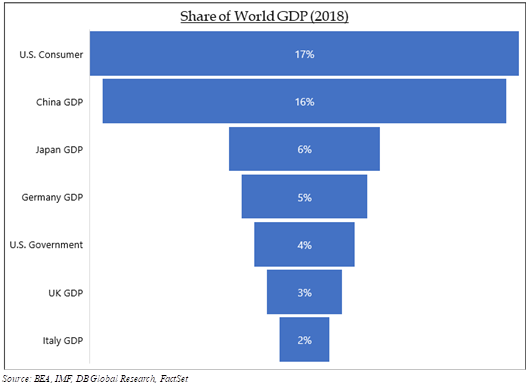- March 11, 2019
- Blog , The Portfolio Strategist - Terry Gardner
C.J. Lawrence Weekly – The U.S. Consumer is the Global Economy’s “Atlas”
Downwardly revised economic growth expectations for China and the Eurozone, and increasing risks to Japan’s economy, may be putting the prospects for continued global economic expansion squarely on the shoulders of the U.S. consumer. A recent report from Deutsche Bank estimated the U.S. consumer’s share of global gross domestic product (GDP) at 17%, followed by China’s economy at 16%, Japan’s economy at 6%, the German economy at 5% and U.S. government spending at 4%. In January the International Monetary Fund (IMF) lowered its global GDP forecast to 3.5% from 3.7% on the back of what it characterized as “looming storm clouds.” Most OECD member sovereign 10-year bonds reflect those clouds, with several experiencing year-to-date low yields that are once again approaching 0%. But according to recent confidence and comfort index readings, the U.S. consumer is feeling strong and may be up to the task of playing the role of Atlas, who according to Greek mythology, carried the weight of the world on his shoulders.

After the U.S. Commerce Department’s delayed release of a punk December retail sales report in February there was growing concern amongst economists that U.S. consumers may be curbing expenditures and hunkering down, potentially weakening the strongest leg of the global growth stool. After all, a consumer retrenchment would be understandable given data provided in last week’s Quarterly Flow of Funds Report released by the Federal Reserve Board showing that U.S. household net worth fell by 3.5% in the fourth quarter. The contraction was primarily the result of a 14% decline in the value of stocks and mutual funds held by households, and the value of household real estate assets that barely appreciated in the quarter. But the Conference Board’s February reading of consumer confidence reached an 18-year high, and last week Bloomberg released a stronger-than-expected Consumer Comfort Index reading, which reached a 17-year high, suggesting the U.S. consumer is feeling good! The macro metrics were reinforced by positive sales results delivered in the past few weeks by important U.S. retailers including Walmart, Target, Kohl’s, Costco and Best Buy.
Meanwhile, consumer discretionary stocks have staged an impressive rally since the December 2018 lows and are on pace with S&P 500 Index performance year-to-date, despite the recent underperformance in sector heavy-weight Amazon.com. Over the past twelve months, the Consumer Discretionary sector index has outpaced the S&P 500 by almost 200 basis points. But there is wide performance disparity within the sector. Over the past three months the Auto Components, Luxury Goods, and Multi-Line Retail industry groups are up 10+%, while the Diversified Consumer Services and Internet and Direct Marketing (Amazon) groups have posted negative price returns. Businesses with higher percentages of domestic sales are outpacing those with broader international exposure and that is likely to continue. The Consumer Discretionary Sector Index’s 2019 sales and earnings forecasts are both expected to eclipse those of the broader market, making it an attractive sector for finding outperformers. Based on current data, the U.S. consumer looks to be up to the task of playing the role of global economic Atlas, supporting economic growth and providing a constructive backdrop for U.S. consumer related businesses and stocks. In some versions of Greek mythology, Atlas was only relieved of his burden of holding up earth, and the heavens, when he defiantly viewed Medusa and turned to stone. Given the fragile geo-economic balance, investors would be wise to stay vigilant for the appearance of a modern-day Medusa.
Terry Gardner Jr. is Portfolio Strategist and Investment Advisor at C.J. Lawrence. Contact him at tgardner@cjlawrence.com or by telephone at 212-888-6403.
